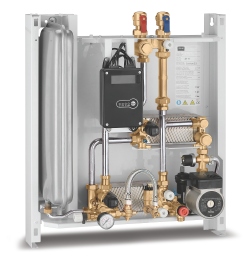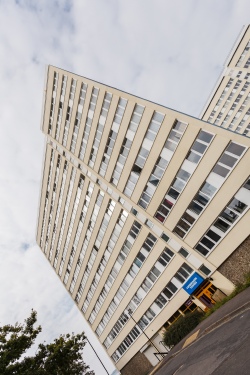Central plant makes a comeback

Simon Carpenter of Ideal Commercial Boilers explores why there is a rapidly growing trend back towards centralised boiler plant in multi-residential properties and how modern heat interface units (HIUs) have been carefully designed by manufacturers to meet the requirements of individual residents and building owners.
There has been an increasing move in the UK away from the installation of individual domestic boilers in each dwelling of a multi-residential building towards communal heating systems. They comprise a centralised plant room with individual heat interface units (HIUs) in each dwelling to give residents full control over their own heating and/or domestic-hot-water supply.
Whilst the use of this type of system across the UK is increasing, the concept of communal heating systems, which refers to any system that supplies heat to multiple dwellings via a centralised energy centre, is not new. Communal heating is used widely across Central Europe for apartment blocks and also as part of large-scale mixed developments. In fact, this type of system was a very common method of domestic heating in the UK for larger-scale estates and high-rise developments, although they lost favour due to issues such as poor control, running costs and reliability. This was when the development of domestic condensing boilers offered a more attractive option.
Advances in HIU technology have extended the options and made the communal system a viable solution that can offer the benefits of centralised plant and also the control and autonomy of individual domestic boilers. As the name suggests, modern HIUs operate as an advanced interface between the central or primary system and the individual dwellings, providing localised control and the ability to accurately monitor the energy consumed via integral heat meters so that occupants only pay for the heating and hot water they actually use.
 |
| Combining the benefits of central plant with local control of heating and hot water in apartments — the heat interface unit. |
The two most common HIUs have integral plate heat exchangers for instantaneous production of heating and hot water. They are generally split into two types.
• Single plate, which control heating or hot water only.
• Twin plate, which control both heating and DHW.
There is a number of variations to this theme. Examples are units with integral DHW storage and units that can be connected to external DHW storage tanks , which highlights the development of HIUs over recent years, although the twin plate units are the most common due to their compact dimensions.
An HIU’s close control and ability to respond much like a domestic boiler to variations in demand for DHW and heating is due to intelligent internal controls and sensors, which in turn trigger electronic valves that react quickly to match user demands and, therefore, only use as much energy as is required. Control valves in modern HIUs are designed to provide good stable control, even in systems with differential-pressure variations and also the ability to work at higher operating pressures, which are ever-more common in modern higher-rise apartment developments.
Another big advantage offered by centralised plant in multi-residential buildings is to simplify the integration of renewable technologies, which is encouraged by legislation such as Part L of The Building Regulations and the Code for Sustainable Homes.
Adding, for example, solar thermal to an individual boiler in each dwelling would be much more costly and time consuming. Each apartment would need buffer storage, pipework, pumping station, individual solar collectors etc. — which would likely make the systems unfeasible.
With a communal system, however, it is more cost-efficient to integrate a commercial-sized solar thermal system centrally with buffer storage in the main plant room. The energy-saving benefits of such a system can then be enjoyed by all residents without standalone systems being required in their flat. This improved ability to introduce renewables centrally has also resulted in the increase and improved development of sustainable CHP systems.
 |
| The refurbishment of tower blocks in Southampton included the installation of twenty 150 kW Evomax boilers from Ideal Commercial Boilers and heat-interface units in each apartment so that tenants only pay for the heating and hot water they actually use. |
Another benefit of HIUs is that in a correctly designed system HIUs as a component part can help achieve the low return temperatures that are increasingly required for the efficient operation of modern and renewable technologies as advised by Part L of the Building Regulations, thereby enhancing the condensing function of modern commercial boilers to further improve system efficiency.
By law, building owners that rent out accommodation must have all boilers serviced annually and provide a gas-safety certificate (if it is a gas boiler), which in the case of individual boilers within dwellings can cause issues with access, costs and time as there could be a large number of boilers requiring inspections per year. Landlords or building managers will also want systems that are straightforward to service and maintain. Communal systems provide this because HIUs do not burn gas, so they do not require any maintenance or yearly safety inspections. The only plant requiring servicing is that within the main energy centre.
Another benefit to building owners is that the inclusion of M-bus meters facilitates remote metering — resulting in simple, accurate automatic billing to the tenants. Both of these benefits remove the need for physical access to each flat to read meters or service equipment, thus minimising disruption to occupants
As with any heating system, each multi-residential building must be assessed individually, as each will have its own unique array of factors that will need to be taken into consideration during the design of the system and the specification of main plant and HIUs. Manufacturers of modern HIUs can offer in-depth training courses as well as technical support to ensure that designers and installers are not only familiar with the product functions and benefits but also have access to sizing, design and commissioning guidance throughout a project, ensuring the systems are well implemented so the benefits offered can be realised in practice.
Simon Carpenter is specification manager for Ideal Commercial Boilers.








